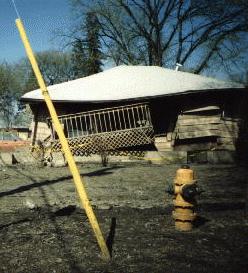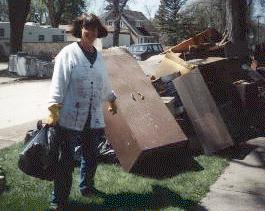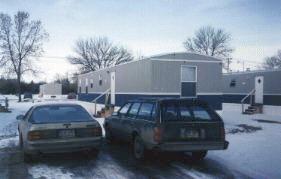|
On April 17, 1997, Jane's birthday, she and her family evacuated from their house on
Lincoln Drive to the house of some friends in the south part of town.
 Many households and businesses were able to bounce back fairly quickly
from the flood. Neighborhoods close to the river, though, were pretty
much wiped out. Houses like this one, down by the dike, were up to their
rooftops in water, and most of Jane's old Lincoln Drive neighborhood will
soon be gone.
Many households and businesses were able to bounce back fairly quickly
from the flood. Neighborhoods close to the river, though, were pretty
much wiped out. Houses like this one, down by the dike, were up to their
rooftops in water, and most of Jane's old Lincoln Drive neighborhood will
soon be gone. |
They took a bag of clothes, each, thinking they would be back home within
a couple of days. Jane also took a few of the things she shares with
school kids, since she was scheduled to go to one of the Grand Forks
elementary schools the next day, where students were going to show her
the illustrations they did of TROUBLE before the book came out.
Two days later, on her oldest son's birthday, a knock came at 2:00 a.m.
and the family had to evacuate for a second time. This time, they drove
through the night to the little town of Walhalla, North Dakota, and slept
for a few hours in the church where her husband had been doing some work
three days a week.
 In the early summer, this was the view from Jane's front porch--sandbags
and trash lined all the streets.
In the early summer, this was the view from Jane's front porch--sandbags
and trash lined all the streets. |
As things turned out, they didn't get back to their own house for about a
month. David, Jonathan, and Rebekah finished school in Walhalla. Jane
sat in the basement of a borrowed house and worked on revisions of THE
STORYTELLER'S BEADS, her novel that will come out next spring. She also
started to write poems about what she was going through. She focused on
some of the same advice she gives to students about their writing:
- Look for the details that really show what an experience is or was like.
- Use the five senses.
- Find unusual comparisons that will help pull the reader into the
experience in unexpected ways.
The little square machine with a wide mouth scooches along and picks up
refrigerators and stoves.
The big machine with a long neck lumbs and swings and nudges garbage into
the street and picks it up in its teeth.
On Belmont Road, a huge yellow machine bends its neck and gobbles the old
clay of the temporary dike.
STOP
working
They all beep beep beep
with a high yellow sound.
(Notes Jane made that turned into one of the pages of her flood book.) |

|
She kept writing all through the mucky, yucky clean-up and all
summer, while she and her family camped in between their upstairs of
their old house and a FEMA travel trailer in the driveway. In the fall,
her editor at Simon & Schuster read her flood poems and liked them.
They'll become a book. Yay! Something good came out of the flood.
The following are two poems Jane wrote after the flood that didn't
make it into the final version of the book.
Winter 1997
Snow mounds like mashed potatoes on our sidewalks.
I shovel, shovel, shovel.
Snow piles onto snow, higher and higher, up to my waist.
I shovel, shovel, shovel.
Snow on snow, up to my head.
It's so cold that
when my mom drives Sarah and me to school,
the car can see its own breath,
misty white in the freezing air.
Other cars
leap
from behind tall snowbanks,
shocking my stomach,
making Sarah squeak.
On Saturdays, Sarah and I walk across the river
to touch Minnesota.
Winter keeps coming.
I shovel, shovel, shovel.
Trucks rumble by, piled high with snow,
carrying it away to some secret snow dumping ground.
"What are we going to do with all the snow?" people ask.
"Shovel it into your basement," someone says.
"Next spring, that's where it will end up anyway."
Everyone laughs.
April 18
"I called Emily,"
Mom says at breakfast.
"I'm worried about her.
I told her to bring the kids and
stay with us.
She said she would, later.
She said they're sandbagging like crazy.
She said they won't lose
the Kennedy Bridge."
At lunch,
we slurp our soup by the radio,
listening, listening.
"I'm tired," says a caller,
"of everyone asking about the Kennedy Bridge.
We're not going to lose the Kennedy Bridge."
At supper, Mom puts her head on her arms.
"They lost the Kennedy Bridge," she says.
"The score," Dad says, "is River: One,
People: Zero."
"I wonder where Emily is," Mom says.
"They got someplace safe for sure," Dad says.
I think of the bridge
running away
on tall, stiff legs
hiding behind
the sugar beet factory.
We can't go to Minnesota.
Aunt Emily can't come here--because
the bridge is lost.
The authors of the following pieces of work are children who experienced the flood.
The '97 Rough Flood
Before the flood, I remember that we had a little pool table, and me and
my brother played pool sometimes and played hockey down there, too.
Sometimes, I saw fishers fishing and catching fish.
After the flood, some people had fish in their basements,
because the river came in.
Before the flood, I picked up sandbags
and it felt like they were lollygaggers.
Right before my eyes, the dike busted and broke,
and it looked like somebody slipped and crushed it.
I could hear the water creeping closer,
until it was rushing down the street
as if it were falling from a waterfall.
After the flood, I sniffed the aroma of the muddy water.
It was like a mixture of dead fish and dirty socks.
I drank juice from the Red Cross.
It tasted like it came from plastic fruit.
Jake, 5th grade
Eric's Flood Details
After the flood, I smelled river water,
moving,
and it smelled like a dead skunk.
I tasted Salvation Army food,
and it tasted like my mom's hamburgers.
I touched mud,
and it felt squishy, like jello.
I saw big tractors,
and they looked like big vaccuum cleaners.
I heard semi trucks, bringing in dirt,
and they sounded like thunder, rumbling.
Eric, 3rd grade
Fire and Flood, Out of Work
On the T.V., I saw a fire.
Where my daddy works got fire all the way down.
The fire was orange and as yellow as my yellow dress
in the picture that got flooded up.
I touched the windows at Lincoln when they let people have a window.
It felt smooth as a sheet.
I heard when they said the Grand Forks Herald
had pictures of anyone's sons and daughters,
so they could find them.
My daddy had food in a box. It didn't get flooded.
It tasted good.
I smelled fire and smoke.
It smelled like hot dogs being cooked.
Mackenzie, kindergarten
The Big Big Flood
I touched spider webs in the basement
and they were sticky.
It smelled like muddy water in the basement.
On the outside, my house looked the same
but my basement was really empty.
All the stuff was outside in front of my house.
My dad cut it all up in pieces.
It was really dark in my basement.
There was still a little water down there.
Erik, kindergarten
Flood Trouble
I saw broken glass. It looked like my friend's house.
She lived in a white house, but it got burned down.
When I was in the flood, somebody threw out my horsie.
It had a pink saddle and a pinkthing on her mouth
and she had pink hair.
I felt mud and it felt like sloppy old mud.
I heard on the news that there was going to be a flood coming.
I felt a drop of water coming into my room.
I smelled my cat when we were leaving.
I told my mom, "We forgot the cat at home."
My friend's house was on the news. She had to move.
I heard that my mom and dad were going camping away from me.
Allison, kindergarten
The Big Bad Flood
I saw sandbags in my driveway,
and they looked big and white.
They felt like bean bags.
I heard my dad pulling the carpet up,
and it sounded like firecrackers.
I smelled carpet in the basement.
It smelled like sour glue.
I tasted Pop Tarts when I was riding in the car.
They tasted like fruit.
I touched a cone that the trucks left in our yard.
It was round as a pipe, with a square bottom.
It felt smooth as a slimy fish.
It had bumpy tape on it, as black as night.
My parents told me not to touch it.
I wanted to keep it.
Amy, 3rd grade
More pictures of the flood
 This photo shows Jane hauling out stuff that was ruined by the floodwater.
This photo shows Jane hauling out stuff that was ruined by the floodwater. |
 The water in David's (Jane's son) room was as high as the arrow pictured here.
The water in David's (Jane's son) room was as high as the arrow pictured here. |
 This is the FEMA trailer in winter in which Jane and her family lived as result of the flood.
This is the FEMA trailer in winter in which Jane and her family lived as result of the flood. |
|